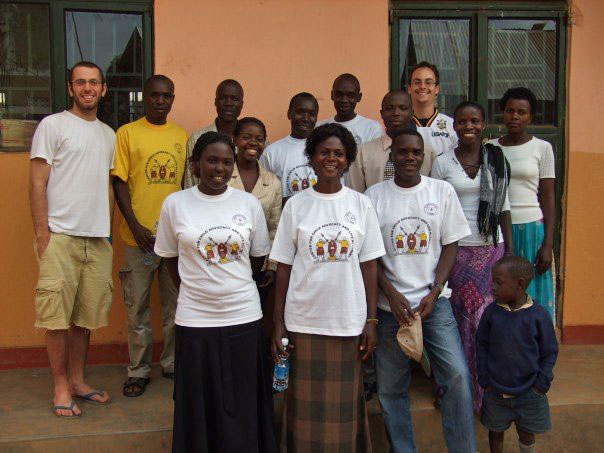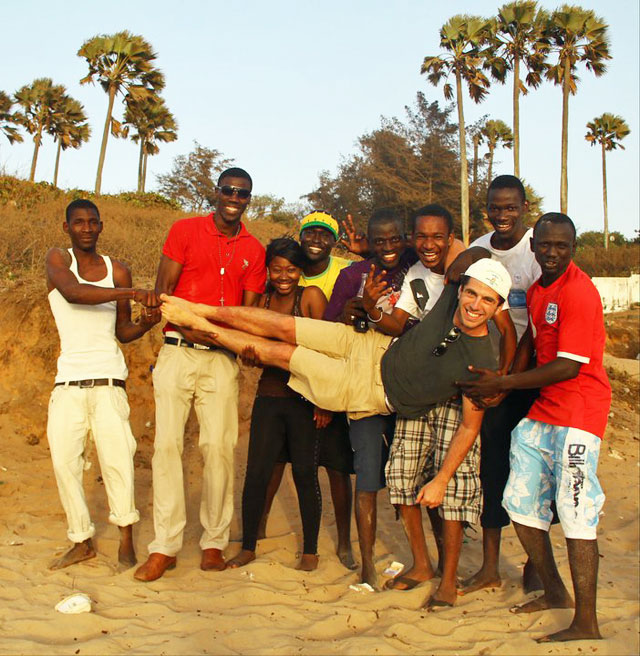Friends in Uganda, Gambia give me hope for LGBT rights
Colin Stewart is a 45-year journalism veteran living in Southern…

I remember the scene like it was yesterday. My friend Brian and I had taken a break from helping to construct a school in rural Uganda. We were seated with a handful of male villagers and Segawa, the director of the Kampala-based orphanage and community organization we were volunteering with. The villagers, with Segawa interpreting, were asking us questions about life back in Canada – what crops we grew, how snow felt, and what sports were popular. Then Segawa asked his own question:
“In Canada, do you have problems with these homosexuals?”
This was in the spring of 2007 and it would be a few more years before Uganda would garner international headlines for its now infamous “kill the gays” bill. I had done very little research on Uganda’s positions on same-sex relationships before leaving for the trip. All that Brian and I agreed on was to keep my sexuality between us. When Segawa asked about problems with homosexuals, he had no idea he was talking to one.
Brian and I glanced and grinned at each other and Brian’s look sent a clear message to me: You can answer the question.
I looked at Segawa and the quorum of villagers and started my answer, pausing so he could translate to what would become a very surprised group:
“Well, Segawa, in Canada we have homosexuals, but we don’t consider them a problem. In fact, in Canada homosexuals are part of society like everyone else. We have homosexual doctors, lawyers, politicians, and police officers.”
The Ugandans let out a collective “eh?” showing their disbelief.
“In Canada,” I continued, “it is possible for two men or two women to marry one another.”
After a brief silence Segawa turned to me with his usual big, warm smile and said, “You know what I think? I think that these people, these homosexuals, are disorganized in the head.”
Wonderful friends
I’ve been fortunate enough to spend extended periods of time in both East and West Africa. In the spring of 2007 I spent a month volunteering in Uganda with Segawa’s organization, and in the 2010-2011 academic year I was a visiting lecturer with the Faculty of Law at the University of The Gambia. Gambia, like Uganda, does not have the best track-record on LGBT rights. Recently, President Jammeh has said Gambians would rather “eat grass” than accept Western aid that was conditioned on LGBT rights.
On both trips I was in the closet except to a small handful of expats. And on both trips I made wonderful friends with Ugandans and Gambians.
In Uganda I got to know not only Segawa and all the local volunteers (Brian and I were the only foreigners), but also many of the students in their care; we became friends, shared meals and memories, and traded hopes and aspirations. But even more than that, I was their muzungu, Swahili for white person. In that small, Ugandan community and they wanted to make sure I felt welcome and was well cared for, and I was.
When the month in Uganda was over the organization threw us a large thank you and farewell party, with all the children and volunteers attending. With money in more than short supply, it was an incredibly generous gesture. The Fanta was flowing, local dishes were in abundance, speeches of thanks were given, I sang a song, and we all said how much we gained from our time together and that we would not soon forget it. Over one hundred people gathered outside for final pictures and hugs.
Back in my African closet
Just over three years later I was back in my African closet, this time in The Gambia. Over the next nine months I would form strong bonds with my students. They had never had permanent lecturers before, so when my friend Danny and I arrived to teach them they were particularly appreciative of the attention we gave them and the efforts we expended on their behalf.

This time I had more than one month to build relationships, I had nine. My students and I interacted every day. Often it was related to lectures, assignments, or exams, but other times we just chatted, about life in Gambia or in Canada. No matter what the context, determined to get as much out of my time as possible, I was never all that concerned about maintaining a strict divide between teacher and student and it didn’t take long for my students and I to drop the formalities. They called me Josh, I would joke with them, and after they got used to my accent and how I spoke, I believe for the most part there was some degree of friendship infused into our relationships. I’d like to think that for most of the relationships that might not have had a friendship component, there was at least respect.
And so I wonder, sitting in Toronto with my boyfriend – the same boyfriend I had while away in Gambia, what my students would think (though some should have figured it out from seeing my Facebook pictures, which I hid from them while I was their teacher) if they learned that their teacher and friend was gay and in a committed same-sex relationship. Would Segawa, who came to know and like me, say that I was disorganized in the head? Most of our students knew about Danny’s girlfriend back home and asked questions about her. Would they have scoffed at me or asked similar questions about my boyfriend like those they asked Danny?
Changing the world
Human relationships change the world. While we cannot emphasize enough the importance of empathy, we have to be honest and admit that it can only go so far. A stranger’s identity exists in the abstract. To the Ugandans and Gambians I befriended, homosexuals were just that, different people existing in the abstract. They were distant realities they never had to confront face to face. But I was real, and they liked me. And so I ask, what would happen if you put the two together – the abstract homosexual, and me.
I’m sure that a few of the people I befriended harbour deep-resentment of gays and lesbians. But for the most part, the prejudices struck me as social conditioning: Gays and lesbians were different; they were not who they as Africans were supposed to be. These were people who had been brought up one way and had never been given a real reason to challenge their beliefs. They weren’t bad people, rallying out for continued discrimination and oppression of gays and lesbians. I doubt any of them had ever knowingly met a gay or lesbian person, let alone one they came to respect and befriend. There was simply no impetus, or need, to empathize with gays and lesbians or raise questions when their leaders, priests, imams, and parents all vocally condemned homosexuality.
Did I miss an opportunity by not coming out to my students? Maybe. But I still maintain that it would have been inappropriate, and risky. I was first and foremost there to teach law, not as a gay-pride missionary, and I was not prepared to take risks to my safety to do so.
Nevertheless, my experiences in Uganda and Gambia have convinced me that hope is not lost on the African continent for LGBT rights. Sure, the challenges are serious and the factors that have to be confronted are many. But the experiences I’ve had and friends I made have convinced me that Africans, just like us, respond to human relationships. As they start to realize that their friends are gay, that some of their community workers are gay, and that some people they respect are gay, their sensitizing to the normalcy of homosexuality can begin a profound rethinking of attitudes and prejudices.
But expectations should be tempered; this will not be a sudden shift.
I’m not asking Segawa or my students to protest for legalizing same-sex marriage in Uganda or Gambia, or lead movements to de-criminalize same-sex sexual activities – though that would be nice. But I don’t think it would be wishful thinking for those who now know that their friend is in fact gay, or for those that would know, to defy African expectations in certain situations.
The next time someone says to them that gays are disorganized in the head, or that we are sub-human, not deserving of the same rights, they could look them in the eye and say that they once knew a gay man, whatever oddities he had were unrelated to his sexuality, that come to think of it, they quite liked and respected this man, and he was their friend.
And from that moment, slowly, slowly, the ripples will start to spread.
Related articles
- Uganda’s slow progress toward LGBT rights (76crimes.com)
- Canada aids foes of Uganda’s anti-gay bill (76crimes.com)
- Gambia drops charges against 20 for ‘homosexual dance’ (76crimes.com)


